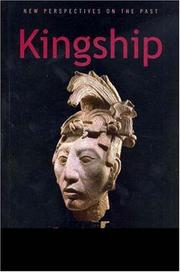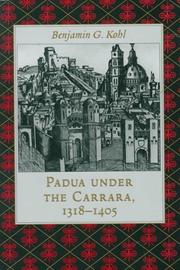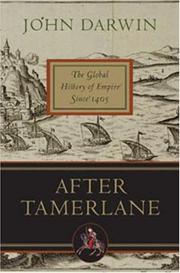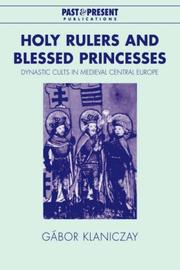| Listing 1 - 10 of 34 | << page >> |
Sort by
|

ISBN: 0631226966 9780631226956 0631226958 9780631226963 Year: 2006 Volume: *3 Publisher: Malden, MA ; Oxford : Blackwell Pub.,
Abstract | Keywords | Export | Availability | Bookmark
 Loading...
Loading...Choose an application
- Reference Manager
- EndNote
- RefWorks (Direct export to RefWorks)
Kings and rulers --- Rois et souverains --- History. --- Histoire --- History --- Kings and rulers - History

ISBN: 0801857031 Year: 1998 Publisher: Baltimore London Johns Hopkins University Press
Abstract | Keywords | Export | Availability | Bookmark
 Loading...
Loading...Choose an application
- Reference Manager
- EndNote
- RefWorks (Direct export to RefWorks)
Book
ISBN: 2228897809 9782228897808 Year: 2003 Publisher: Paris: Payot,
Abstract | Keywords | Export | Availability | Bookmark
 Loading...
Loading...Choose an application
- Reference Manager
- EndNote
- RefWorks (Direct export to RefWorks)
Astrology --- Kings and rulers --- History, Ancient --- History --- Miscellanea --- Philosophie de la culture --- Philosophie sociale --- Sociologie de la culture --- Astrology - History --- Kings and rulers - History - Miscellanea --- History, Ancient - Miscellanea
Book
Year: 1831 Publisher: Paris: Denain,
Abstract | Keywords | Export | Availability | Bookmark
 Loading...
Loading...Choose an application
- Reference Manager
- EndNote
- RefWorks (Direct export to RefWorks)

ISBN: 9781596913936 1596913932 Year: 2008 Publisher: New York Bloomsbury
Abstract | Keywords | Export | Availability | Bookmark
 Loading...
Loading...Choose an application
- Reference Manager
- EndNote
- RefWorks (Direct export to RefWorks)
World history --- History, Modern --- Kings and rulers --- Monarchy --- History --- Kings and rulers, Primitive --- Monarchs --- Royalty --- Rulers --- Sovereigns --- Heads of state --- Queens --- Modern history --- World history, Modern --- Czars (Kings and rulers) --- Tsars --- Tzars --- History. --- Kings and rulers - History --- Monarchy - History
Book
ISBN: 0198202067 019167513X Year: 1992 Publisher: Oxford Clarendon
Abstract | Keywords | Export | Availability | Bookmark
 Loading...
Loading...Choose an application
- Reference Manager
- EndNote
- RefWorks (Direct export to RefWorks)
Monarchy --- -Monarchy --- -Kingdom (Monarchy) --- Executive power --- Political science --- Royalists --- History --- -History --- -Europe --- Council of Europe countries --- Eastern Hemisphere --- Eurasia --- Kings and rulers --- -History. --- Kingdom (Monarchy) --- Europe --- Kings and rulers. --- Monarchy - Europe - History. --- Europe - Kings and rulers - History.
Book

ISBN: 3110411709 3110411768 9783110411716 Year: 2015 Publisher: Berlin : De Gruyter
Abstract | Keywords | Export | Availability | Bookmark
 Loading...
Loading...Choose an application
- Reference Manager
- EndNote
- RefWorks (Direct export to RefWorks)
This volume looks acrossdifferent periodsto develop a comparative analysis of different monarchies with respect to the function of their political systems. The studies focus on elite groups, on strategies of sacralization as pretexts to generate and perpetuate the legitimacy of monarchies, and on strategies to establish various forms of historical memory.
Kings and rulers -- History --- Monarchy -- History --- Representative government and representation -- History --- Divine right of kings --- Monarchy --- Kings and rulers --- Power (Social sciences) --- Legitimacy of governments --- Elite (Social sciences) --- Nationalism and collective memory --- Comparative government --- History --- Religious aspects --- History --- History
Book
ISBN: 9781472424488 9781315594736 9781317098126 9781317098133 9780367879327 0367879328 1472424484 1472424506 1472424492 Year: 2016 Publisher: London Routledge, Taylor & Francis Group
Abstract | Keywords | Export | Availability | Bookmark
 Loading...
Loading...Choose an application
- Reference Manager
- EndNote
- RefWorks (Direct export to RefWorks)
History of civilization --- History of the United Kingdom and Ireland --- anno 1400-1499 --- anno 1500-1599 --- anno 1600-1699 --- Power (Social sciences) --- Authority --- History --- Scotland --- Great Britain --- Kings and rulers --- Power (Social sciences) - Scotland - History - To 1500 --- Power (Social sciences) - Great Britain - History - To 1500 --- Scotland - Kings and rulers - History - To 1500 --- Great Britain - Kings and rulers - History - To 1500 --- Scotland - History - 1057-1603 --- Great Britain - History - 1066-1687

ISBN: 9780521038997 9780521420181 0521420180 Year: 2007 Publisher: Cambridge Cambridge university press
Abstract | Keywords | Export | Availability | Bookmark
 Loading...
Loading...Choose an application
- Reference Manager
- EndNote
- RefWorks (Direct export to RefWorks)
Hongrie --- Europe centrale --- Christian saints --- Kings and rulers --- Kings and rulers, Primitive --- Monarchs --- Royalty --- Rulers --- Sovereigns --- Heads of state --- Queens --- Saints --- Canonization --- Cult --- History --- Religious aspects --- Christianity --- Europe, Central --- Hungary --- Central Europe --- Kings and rulers. --- Czars (Kings and rulers) --- Tsars --- Tzars --- Rois et souverains --- Saints chrétiens --- Christianity. --- Aspect religieux --- Christianisme --- Culte --- History of civilization --- Christian special devotions --- anno 500-1499 --- Eastern and Central Europe --- Kings and rulers - Religious aspects - Christianity - History - To 1500 --- Christian saints - Cult - Europe, Central - History - To 1500 --- Christian saints - Cult - Hungary - History - To 1500 --- Europe, Central - Kings and rulers - History - To 1500 --- Hungary - Kings and rulers - History - To 1500
Book
ISBN: 9783825362478 3825362477 Year: 2013 Volume: 2 Publisher: Heidelberg, Neckar : Universitätsverlag Winter GmbH Heidelberg,
Abstract | Keywords | Export | Availability | Bookmark
 Loading...
Loading...Choose an application
- Reference Manager
- EndNote
- RefWorks (Direct export to RefWorks)
The early Irish and Indian sources afford similar depictions of ideal ruling, based not only on the topics of cosmos, social order and justice universally connected with kingship, but also on the moral themes. On the basis of extensive textual evidence, these visions of regal power are taken as idealised, rather than historical, constructs. The sources, that are newly edited and translated, include Hiberno-Latin and vernacular Irish wisdom-texts, as well as the Buddhist canonical sutras in Pali, discussed in the light of the early Indian political theory and the royal inscriptions of Ashoka. It is examined how the compilers of the texts used ideological structures already in place, inherited from the earlier traditions. The way the semantics, syntax and subject-matter of the compilations had been adjusted is scrutinised, the ethical dimension to be seen as a watershed between the old and the new visions of power, epitomised in the dichotomy of the 'right' and the 'righteous'.
Kings and rulers --- Middle Ages --- Representation (Philosophy) --- Rois et souverains --- Moyen Age --- Représentation (Philosophie) --- History. --- Histoire --- Ireland --- India --- Europe --- Irlande --- Inde --- History --- Monarchy --- Divine right of kings --- Moral and ethical aspects --- Early works to 1800 --- Sources --- Monarchy - Moral and ethical aspects - Early works to 1800 --- Divine right of kings - Early works to 1800 --- Monarchy - Moral and ethical aspects - Ireland - Early works to 1800 --- Monarchy - Moral and ethical aspects - India - Early works to 1800 --- Ireland - Kings and rulers - History - Sources --- India - Kings and rulers - History - Sources
| Listing 1 - 10 of 34 | << page >> |
Sort by
|

 Search
Search Feedback
Feedback About UniCat
About UniCat  Help
Help News
News